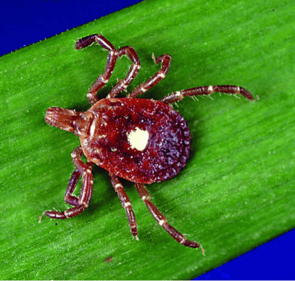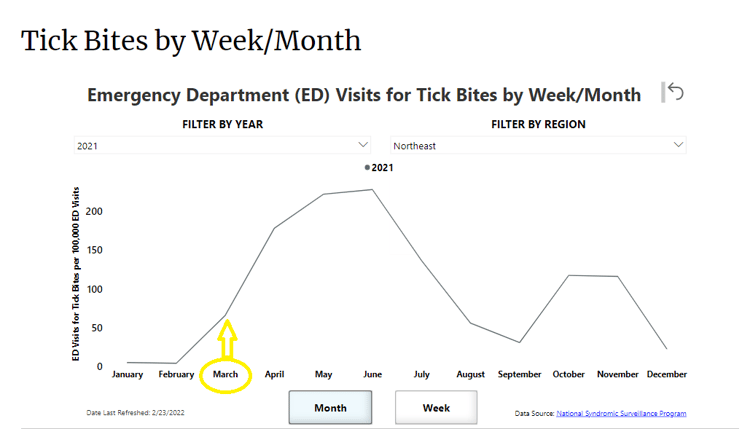Although many of us in New England are still hitting the slopes, building snowmen, and wearing parkas when we leave the house the reality is spring is around the corner. Others are already "over it" and are contemplating new garden layouts, spring home improvement projects, and planning the first hikes of the season. But is it really time to start worrying about ticks and the diseases they carry?
"The most common tick-borne diseases in Massachusetts are Lyme Disease, Babesiosis, and Anaplasmosis. Other diseases that are more rare, but still occur, are Tularemia, Rocky Mountain spotted fever, Borrelia miyamotoi, and Powassan virus." (Mass.gov)
What Is Tick Season?
A common misconception is that there is a defined tick season. The truth is ticks can be active any time the temperature is above freezing and depending on where you live that could be year-round. In our 10+ years of experience, March is the month when most people in New England start seeing aggressive tick activity. Your chances of getting a tick on your while recreating outdoors in March is quite high in Massachusetts, Rhode Island, Vermont, Connecticut, New Hampshire, and Maine as seen in the chart below from the CDC.
Where Do Ticks Go In Winter?
There are many species of ticks and they all differ slightly when winter arrives. In general, ticks stay active as long as temps. are above freezing and there is no snow on the ground.
- Deer Ticks
- Go dormant but will re-emerge any time the temps rise above freezing and there is no snow coverage.
- Can transmit Lyme disease, Powassan virus, Babesiosis, Anaplasmosis, Borrelia miyamotoi bacteria, ehrlichiosis
- American Dog Ticks
- Go dormant for most of the winter
- Can transmit Ehrlichiosis, Rocky Mountain Spotted Fever, Tularemia
- Lone Star Ticks
- Go dormant for most of the winter
- Can transmit Ehrlichia chaffeensis and Ehrlichia ewingii, tularemia, and STARI

How Can You Best Protect Yourself From Ticks?
- Perform Regular Tick Checks
- After hanging out, recreating, or doing work outdoors make sure to do a thorough tick check of both people and pets. Both on clothing and skin. Throw your clothes in the dryer to be sure that you kill off all ticks that "hitch a ride inside".
- Hire a Trusted and Professional Organic Tick Control Company
- With the rise in ticks, there is a rise in companies claiming to treat properties for ticks. Many offer harsh toxic chemical solutions that are not safe for use around you, children, pets, or the environment. Make sure you hire a company that can service your property regularly, is insured, has good equipment, and is invested in your community. At Pure Solutions, we offer an all-natural tick control company that safely and effectively removes ticks from your yard.
- Wear Proper Clothing
- Bright clothing makes it much easier to spot ticks, some are as small as a poppy seed. Also tucking your pants into your socks can be effective. There are some clothing options that can be treated with tick repellent permethrin spray as well.
- Use an All-Natural Tick Repellent Spray
- There are plenty of insect repellent options. However, we suggest looking for more natural options that are essential oil-based. Better for you and the environment while still being effective.
- Avoid Tick Infested Areas
- Ticks enjoy crawling out on branches, leaves, and sticks to "quest". By avoiding areas with lots of brush and undergrowth and staying on the trail, you can cut your risk of exposure to ticks.
With warmer temps and limited snowfall, this winter tick populations are going to be robust and healthy this spring. This year is shaping up to be one of the most active tick seasons in history, a trend that unfortunately seems here to stay. Don't wait until the populations become active and lay eggs and explode in size on your property, contact us today for a free quote and learn how Pure Solutions can keep you and your family protected this Spring.



